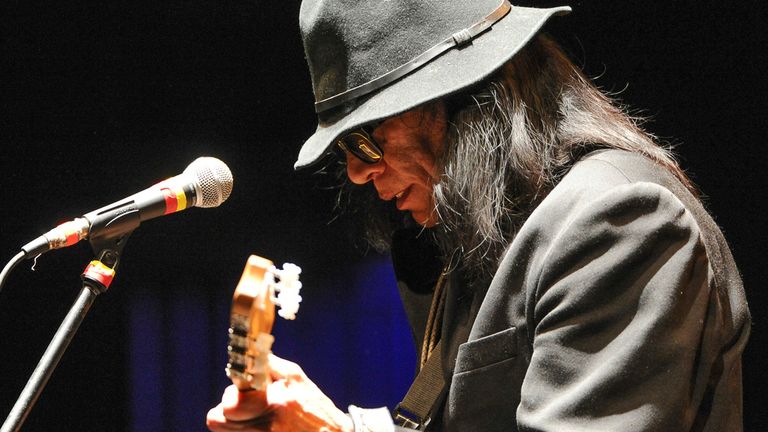[ad_1]
Singer-songwriter Sixto Rodriguez, who became the subject of the Oscar-winning documentary Searching for Sugar Man, has died aged 81.
The American singer’s death was confirmed by his granddaughter Amanda Kennedy on Wednesday after being posted to the website Sugarman.org a day earlier.
He died in Detroit following a short illness, according to his wife, Konny Rodriguez, 72.
It was the documentary Searching for Sugar Man by Swedish filmmaker Malik Bendjelloul that made Rodriguez recognisable to a much larger audience.
The film tells of two South Africans and their mission to seek out the fate of their musical hero.
It won the Oscar for best documentary in 2013.
‘More popular than Elvis’
Despite his music not making much of a mark in America, Rodriguez unknowingly became a star in South Africa.
He was described as “more popular than Elvis” in the country, by record shop owner Stephen ‘Sugar’ Segerman, whose nickname comes from Rodriguez’s song Sugarman.
His songs protesting the Vietnam War, racial inequality and the abuse of women were banned by the apartheid regime, but inspired liberals horrified by the country’s racial segregation system.
Fans in South Africa believed his fame transferred to the US. Some even thought the star had died, after rumours circulated he had taken his own life on stage.
In reality, the singer had returned to Detroit, where he had gone “back to work” in manual labour.
He had three daughters and launched several unsuccessful campaigns for public office, but never stopped playing music.
It wasn’t until the 1980s that Rodriguez learned about his fame in South Africa, and after the end of apartheid in 1990 the star travelled to the country to perform and later pursued royalties he did not receive from his music being used and played there.
“He did so well in South Africa. It was insane,” Mrs Rodriguez said.
His music was also a big hit in Australia, where he toured in both 1979 and 1981, after picking up the phone to a “man with an Australian accent” who said: “He must come to Australia because he’s very famous here.”
Rodriguez was also described as “the greatest protest singer and songwriter that most people never heard of” in 2013 by The Associated Press.
[ad_2]
Source link








